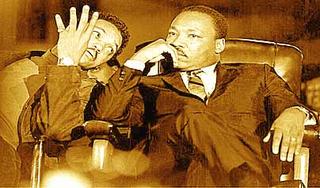CONSPIRACY: Who Killed Martin Luther King Jr?

On April 4, 1968, at 6:01pm Martin Luther King Jr. was gunned down by a sniper. The slaying sparked riots in more than 100 cities and left the civil rights movement in disarray. Almost immediately came charges of cover-ups and government complicity. The suspicions have not waned with time.
In 1968, the official explanation told of a small-time criminal named James Earl Ray who, motivated by racism and a desire for fame, acted alone in killing Dr. King. The enigmatic drifter and thief confessed to the murder in 1969 and was sentenced to 99 years in prison. But he immediately recanted, claiming he had been coerced. From that time until his death in 1998, Ray tried unsuccessfully to get a trial, insisting that a mysterious smuggler known as "Raul" framed him and likely was the true assassin
In 1978, after a two-year investigation, the US House Select Committee on Assassinations (HSCA) offered a radically different version of the official truth: namely, that "on the basis of circumstantial evidence available to the committee, James Earl Ray assassinated Dr. Martin Luther King, Jr. as a result of a conspiracy". According to the HSCA report, a $50,000 bounty had reportedly been posted on King's life by a racist, loosely organized St. Louis group that including a drug-dealing real estate developer and a wealthy industrialist.
This coclusion, thin on hard evidence and lacking any government connection, is dismissed as myth by many experts. There is, they say, an abundance of evidence to indicate that U.S. federal government agencies were out to get King, and that they had far greater motivation to do so than James Earl Ray.
King was surveilled by the FBI, CIA and Army Intelligence as a dangerous radical who threatened national security. FBI Director J. Edgar Hoover hated King intensely and wanted him ''neutralised." Hoover worked hard to discredit King and destroy him both personally and politically.
The FBI's political vendetta smacked of police state tactics, and proponents of a government-orchestrated plot ask: if the FBI would so willingly trample the rights of a citizen it perceived as an insidious domestic threat, why should Americans believe that the organisation would stop short of terminating King? This view has been endorsed by no less than the King family itself. Nearly three decades after his father's death in Memphis, Dexter King declared that James Earl Ray was "innocent," and in a widely publicised meeting, shook the alleged assassin's hand.
To date, the King family has shirked criticism that their stance is a betrayal of King's legacy; in fact, they steadfastly maintain that the assassination conspiracy involved the CIA, the FBI, and Army intelligence - even President Lyndon Baines Johnson.
There's enough ambiguity in this story to sustain all sides. But of all the assassinations that rocked the '60s, many experts say this one is the least explicable and therefore the most troubling. Revisiting Martin Luther King's murder opens a door to Americans' darkest fears about the government's capacity to act against its own people.

0 Comments:
Post a Comment
<< Home